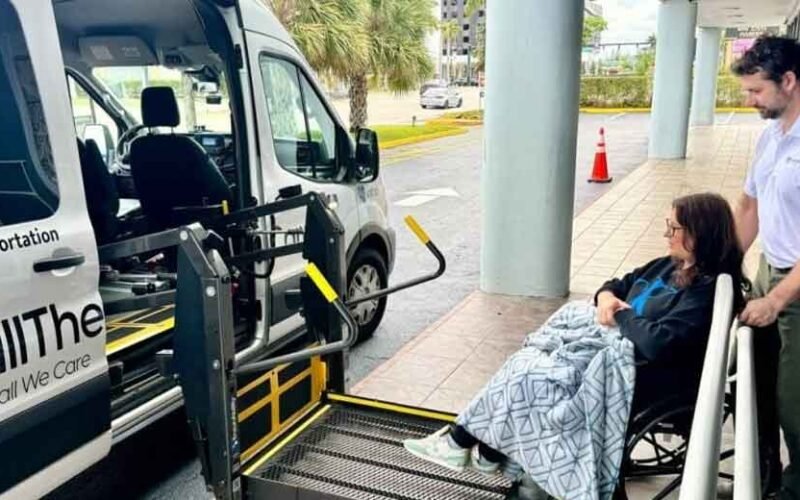Long-distance travel can be a challenging experience, especially for individuals with disabilities who require consistent care, attention, and secure accommodations. Unlike everyday commutes, these journeys can span hours or even days, often involving medical considerations, unique comfort needs, and emotional stress. Long-distance transport services designed for disabled riders serve as a critical solution to these concerns, offering more than just a means of getting from one place to another. They create an environment that respects the individual’s medical and emotional conditions while preserving their dignity.
From accessible vehicles to trained personnel, these services go beyond logistics to restore a sense of independence and calm. Long-distance providers like medic-trans.com focus on delivering reliable, compassionate care for disabled individuals throughout extended journeys. We will explore how these services are tailored to ensure that riders with disabilities receive the attention and care they need during extended trips, all while remaining as comfortable and respected as possible throughout the journey.
Key Ways Long Distance Transport Services Prioritize Dignity and Comfort
- Specially Designed Vehicles That Reduce Discomfort and Stress
One of the most important aspects of long-distance transportation for individuals with disabilities is the vehicle itself. These are not typical vans or buses; they are equipped with advanced features tailored for accessibility, medical support, and comfort. Wheelchair ramps, hydraulic lifts, and secure locking mechanisms are standard to ensure safety during loading and unloading. Inside the vehicle, a setup similar to a mobile clinic is often found, spacious enough to accommodate stretchers, medical equipment, and seating for companions. The climate inside is controlled to prevent temperature fluctuations that could cause discomfort or exacerbate medical conditions.
Suspension systems are typically enhanced to minimize bumps and vibrations on long routes, ensuring a smooth ride. Many vehicles include tinted windows and privacy screens, which contribute to a sense of security and dignity. These design features allow riders to feel less like patients and more like valued individuals being transported with care and attention. This shift in perception is critical in preserving mental and emotional well-being during extended journeys.
- Trained Personnel Who Offer Compassionate, Individual-Focused Care
What truly sets long-distance transport apart is the caliber of the staff who accompany the riders. These are not just drivers; they are medical transportation professionals who understand both the physical and emotional needs of passengers with disabilities. They are trained to handle a variety of mobility aids, administer necessary medications, monitor vital signs, and respond quickly to medical changes or emergencies.
However, their role extends far beyond the technical. The way they interact with riders makes a significant difference. They communicate respectfully, understand the importance of giving passengers choices whenever possible, and speak with consideration. Simple gestures, such as asking before assisting or regularly checking on comfort levels, can have a profound effect. The presence of such attentive care helps riders feel secure and respected, especially when traveling far from familiar settings. This sense of being seen and supported restores personal dignity and reinforces the idea that their needs are being prioritized, not just accommodated.
- Personalized Travel Plans That Consider Health and Emotional Needs
No two individuals require the same care. That’s why long-distance transport services create tailored plans that reflect the specific needs of each passenger. Before the trip begins, a detailed consultation is held to assess the rider’s physical condition, any required medications, mobility limitations, and emotional considerations. This could include dietary needs, preferred rest times, or even the presence of service animals or family companions. The route is planned to include designated stops for rest, toileting, or medical checks. If the individual requires oxygen support, cardiac monitoring, or other continuous care, these arrangements are made in advance.
Emotional comfort is also factored in. Many services encourage the presence of a family member to reduce anxiety or include soothing music and visual aids inside the vehicle. Through these personal touches, the rider does not feel like cargo in transit but rather a person whose unique situation has been carefully planned for. This degree of customization is a strong pillar in ensuring dignity and comfort.
- Focus on Privacy and Autonomy Throughout the Journey
Maintaining a sense of privacy can be challenging during long-distance travel, especially when care is involved. However, long distance transport services take deliberate steps to make riders feel as autonomous and private as possible. From private transport arrangements (rather than group travel) to physical barriers inside the vehicle that provide visual privacy, these considerations help riders feel secure. When care is needed during the journey—such as assistance with mobility or hygiene—the staff is trained to handle it with discretion and professionalism.
Riders are given opportunities to express preferences, such as when and how they receive care, which reinforces their sense of control. Personal belongings are stored within easy reach to avoid constant dependence on staff. These elements, while seemingly small, play a significant role in reducing feelings of vulnerability or helplessness. The goal is to empower passengers, not just transport them, so that even during a long trip, they retain a sense of dignity, independence, and comfort.
Long-distance transport services for disabled riders are not just about covering miles—they are about creating an experience rooted in respect, safety, and compassion. From thoughtfully engineered vehicles to the deeply human interactions with trained caregivers, every element is designed to maintain dignity and enhance comfort. Personalized planning ensures that no rider feels like just another case, while privacy, emotional support, and consistent family communication turn what could be a stressful event into a reassuring one. These services recognize that travel for a disabled individual isn’t just physical—it’s personal, emotional, and deeply impactful. In doing so, long-distance transport becomes more than a service—it becomes a lifeline that honors the individual and supports their journey with both care and dignity.










